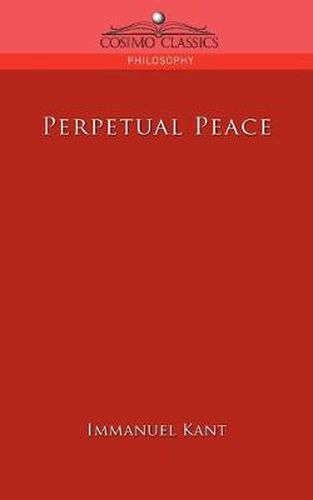Readings Newsletter
Become a Readings Member to make your shopping experience even easier.
Sign in or sign up for free!
You’re not far away from qualifying for FREE standard shipping within Australia
You’ve qualified for FREE standard shipping within Australia
The cart is loading…






This title is printed to order. This book may have been self-published. If so, we cannot guarantee the quality of the content. In the main most books will have gone through the editing process however some may not. We therefore suggest that you be aware of this before ordering this book. If in doubt check either the author or publisher’s details as we are unable to accept any returns unless they are faulty. Please contact us if you have any questions.
Between states… no punitive war is thinkable because between them a relation of superior and inferior does not exist. Whence it follows that a war of extermination, where the process of annihilation would strike both parties at once and all right as well, would bring out perpetual peace only in the great graveyard of the human race. -from Perpetual Peace One of the most influential thinkers of the Western civilization, a man who profoundly shaped the mind-set of the modern world, examines war and human nature and concludes, bracingly, that global peace is inevitable. Far from an unattainable utopian fantasy, this 1795 essay lays out the requirements for peace, including republican governments, freedom of movement for citizens, and-prophetically-the formation of a league of nations. In this era of imperialistic ambitions and preemptive wars, Kant’s insight is a profound reminder that peace is possible but must be actively pursued. Also available from Cosimo Classics: Kant’s Analytic of the Beautiful and Perpetual Peace. German metaphysician IMMANUEL KANT (1724-1804) served as a librarian of the Royal Library, a prestigious government position, and as a professor at Koenigsberg University. His other works include Observations on the Feeling of the Beautiful and Sublime (1764), Critique of Pure Reason (1781), and Groundwork of the Metaphysics of Morals (1785).
$9.00 standard shipping within Australia
FREE standard shipping within Australia for orders over $100.00
Express & International shipping calculated at checkout
Stock availability can be subject to change without notice. We recommend calling the shop or contacting our online team to check availability of low stock items. Please see our Shopping Online page for more details.
This title is printed to order. This book may have been self-published. If so, we cannot guarantee the quality of the content. In the main most books will have gone through the editing process however some may not. We therefore suggest that you be aware of this before ordering this book. If in doubt check either the author or publisher’s details as we are unable to accept any returns unless they are faulty. Please contact us if you have any questions.
Between states… no punitive war is thinkable because between them a relation of superior and inferior does not exist. Whence it follows that a war of extermination, where the process of annihilation would strike both parties at once and all right as well, would bring out perpetual peace only in the great graveyard of the human race. -from Perpetual Peace One of the most influential thinkers of the Western civilization, a man who profoundly shaped the mind-set of the modern world, examines war and human nature and concludes, bracingly, that global peace is inevitable. Far from an unattainable utopian fantasy, this 1795 essay lays out the requirements for peace, including republican governments, freedom of movement for citizens, and-prophetically-the formation of a league of nations. In this era of imperialistic ambitions and preemptive wars, Kant’s insight is a profound reminder that peace is possible but must be actively pursued. Also available from Cosimo Classics: Kant’s Analytic of the Beautiful and Perpetual Peace. German metaphysician IMMANUEL KANT (1724-1804) served as a librarian of the Royal Library, a prestigious government position, and as a professor at Koenigsberg University. His other works include Observations on the Feeling of the Beautiful and Sublime (1764), Critique of Pure Reason (1781), and Groundwork of the Metaphysics of Morals (1785).